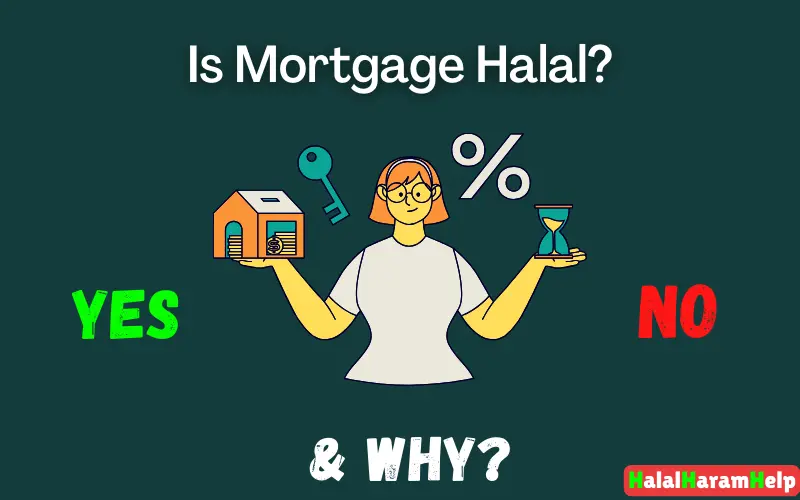When it comes to Islamic finance, the question of whether mortgages are halal (permissible) stirs up a lot of discussion.
It’s not just about the legality but also about how these financial practices align with Islamic principles. The debate often revolves around whether interest-based transactions comply with Shariah law.
Hence, in this article, we dive into this topic to answer is Mortgage halal or haram considering different viewpoints and shed light on the complexities involved.
By understanding these perspectives, we can better grasp the ethical considerations at play in modern financial decisions. So let’s get started.

Is Mortgage Halal?
No, conventional mortgages are generally not halal. This is primarily because they involve paying or receiving interest, known as riba in Arabic, which is explicitly prohibited in Islamic finance.
To understand it you should know what is Mortgage and how it works.
A mortgage is a loan specifically designed for purchasing real estate, typically a home.
It allows individuals to buy property without having to pay the full purchase price upfront. Instead, the borrower (homebuyer) agrees to repay the lender (usually a bank) over a set period, often 15 to 30 years, with added interest.
That’s where interest is involved and make it haram.
Understanding the Prohibition of Riba:
In Islam, riba, or interest, is seen as exploitative and unjust. The Quran explicitly forbids riba, stating that it is not permissible for Muslims to either pay or receive interest.
This prohibition is rooted in the belief that money should not generate more money without being linked to actual economic activity. Thus, any financial transaction involving interest is considered haram (prohibited).
To learn in detail about interest, you can learn here is it haram to pay interest.
Alternatives to Conventional Mortgages
Islamic finance offers alternatives to conventional mortgages that comply with Shariah principles. These alternatives are structured to avoid interest and instead focus on shared ownership and profit/loss sharing.
The most common Islamic mortgage structures include:
1. Murabaha (Cost-Plus Financing):
In a Murabaha arrangement, the bank buys the property and then sells it to the buyer at a higher price, which includes a profit margin. The buyer pays this price in installments.
While the end cost may be similar to a conventional mortgage, the profit margin is agreed upon upfront, eliminating any interest component.
2. Ijarah (Lease-to-Own):
Under Ijarah, the bank purchases the property and leases it to the buyer. The lease payments include a portion that goes towards ownership of the property.
Once all payments are made, ownership is transferred to the buyer. This avoids interest as the payments are structured as rent rather than interest-bearing loan repayments.
3. Musharakah (Joint Ownership):
In a Musharakah arrangement, both the bank and the buyer jointly purchase the property. The buyer gradually buys out the bank’s share while paying rent for the bank’s portion.
Over time, the buyer’s equity in the property increases until full ownership is achieved.
Also learn is car finance halal.
FAQs
Q. Is Mortgage halal in Dubai?
A: Yes, Dubai offers halal mortgage options through Islamic banks that comply with Shariah law. These include financing structures like Murabaha, Ijarah, and Musharakah, which avoid interest and adhere to Islamic principles.
Q. Does the US have halal Mortgages?
A: Yes, there are halal mortgage options in the US provided by Islamic financial institutions. These institutions offer Shariah-compliant financing alternatives such as Murabaha and Ijarah to cater to the needs of Muslim homebuyers.
Q. Is Mortgage interest allowed in Islam?
A: No, mortgage interest is not allowed in Islam. Interest, or riba, is explicitly prohibited in Islamic finance, as it is considered exploitative and unjust. Muslims are encouraged to seek Shariah-compliant financing options that avoid interest.
Conclusion
In summary, while conventional mortgages are not considered halal due to their reliance on interest, there are several Shariah-compliant alternatives available.
These alternatives, such as Murabaha, Ijarah, and Musharakah, offer ways to finance property purchases without violating Islamic principles.
So, always look for guidance from experts who can ensure that one’s financial practices align with their religious beliefs.


